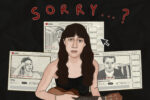As the world (especially those who frequent the internet) gets more knowledgeable about how to be open-minded and accepting of others, it becomes glaringly obvious when someone or something hasn’t caught up with the times. Oftentimes, people hastily call out anyone or thing they believe isn’t being sensitive enough. Thus, the popularity of the word “problematic” was born.
I see the word generously sprinkled across the internet, like someone over-salting a steak. The thing about salt is that a little bit is important to enhance the eating experience, but too much suddenly makes the entire steak inedible.
Problematic is often used to accompany people or content that someone views as being culturally insensitive or providing a negative representation of a marginalized group. It is mostly used in regards to race, sexuality and cultural representation. I’m not saying it is an evil word that should, under no circumstances, be employed.
In fact, a lot of times the person using it is generating an important, nuanced discussion about an important, nuanced social issue. However, there are some people who are just a bit too trigger-happy with the word and want to apply it to everything they disagree with, which creates problems in itself. With that in mind, here are five reasons to use the word problematic less.
1. It detracts from learning opportunities.
Overusing problematic or using it incorrectly not only detracts from the instances in which the word is doing real work, but it can also overwhelm those who are trying to learn.
No one emerged from the womb knowing everything about social justice. People need to learn, and many people turn to social media for information. There are so many brilliant and enlightening sources tucked into all corners of the internet, but it can be difficult to discern which voices to listen to.
When nearly everything and everyone is being labeled as problematic, the challenge just becomes greater. Contradicting opinions fly in every direction. Content is stripped down and analyzed with biases. It is a lot to deal with and it is nearly impossible to find value in the discussions.
2. Highlighting problematic content should generate discussion rather than hate.
I cannot even count the number of times I’ve scrolled through social media to find tweets and articles and blog posts putting people on blast for being problematic. Some people take screenshots of something someone said (oftentimes out of context) and just put the offender on blast.
The posts are designed to inspire anger. Anyone deemed problematic gets “ canceled” and they get sent hate messages. If it’s a celebrity, people who support their work are suddenly on the receiving end of the public backlash. Books get boycotted because a handful of people claim problematic content.
This is not a healthy discussion. It’s not wrong to be hurt or angry about what someone said, but this mob mentality is toxic and it does not do anyone any favors.
3. Problematic is not about individual experience.
There is no such thing as the one true experience. It is literally impossible for a book or a movie to capture the universal experience of racism, sexism, homophobia, etc. It’s not fair to put that kind of pressure on anyone, and yet I see a lot of people calling out content for being problematic simply because it does not align with their experience.
It’s perfectly valid to explain why you could not relate to something. It’s perfectly valid to explain why a certain representation hurts you. But to declare something problematic because it doesn’t match your expectations isn’t fair.
What one person finds problematic, another person may find relatable and cathartic. By labeling content as problematic, a person is not only potentially turning away someone else from materials that might help them, but also invalidating others’ real-life experiences.
4. Older content should not be held to the same standards.
There’s no denying that the social landscape has changed tremendously, even over just the last few years. What was socially acceptable five years ago is considered scandalous now. That said, why should media from that time be expected to match newly-founded expectations.
Content from 10 years ago is going to use language that is uncomfortable now, and while it’s important to highlight that language and why it shouldn’t be used anymore, you can’t get angry with whoever made the content for not predicting the climate of the present. Instead of labeling things of the past as problematic, talk about the issues.
Which brings me to my final point:
5. Problematic is a blanket word.
At the end of the day, I think this issue causes all the aforementioned difficulties with the word “problematic.” What does the word even mean? Can’t literally everything on this planet be interpreted as problematic?
People use the word problematic to avoid digging into discussion, getting to the real heart of an issue. If a book has racist undertones in it, just say that. If you don’t think a movie portrayed bisexuality in a healthy way, say that. Talk about what really bothers you about something and then let others decide if it bothers them, too.
Though it may not always seem like it, humans are capable of forming their own opinions. They don’t just decide something is true because a character or a celebrity says it (most of the time). So, calling something problematic and telling people not to waste their time with it isn’t a good way to promote open-mindedness. That attitude promotes hive-mindedness.
None of this is to say that you shouldn’t discuss aspects in media you find troubling. Rather, I implore you to do so in a way that is healthy and helpful, to do so in a way that doesn’t shame people. When the point of being more socially aware is to encourage inclusivity, it seems counterproductive to make others feel awful for making a mistake — or even for merely liking content that isn’t perfect in your eyes.
Discourse is crucial to growth within our society. Toxic discourse, however, will only lead to divisions. In this political atmosphere, there’s basically already a social civil war raging, and there’s no need to exacerbate that with this “everything is problematic” culture society has seemed to adapt.

















